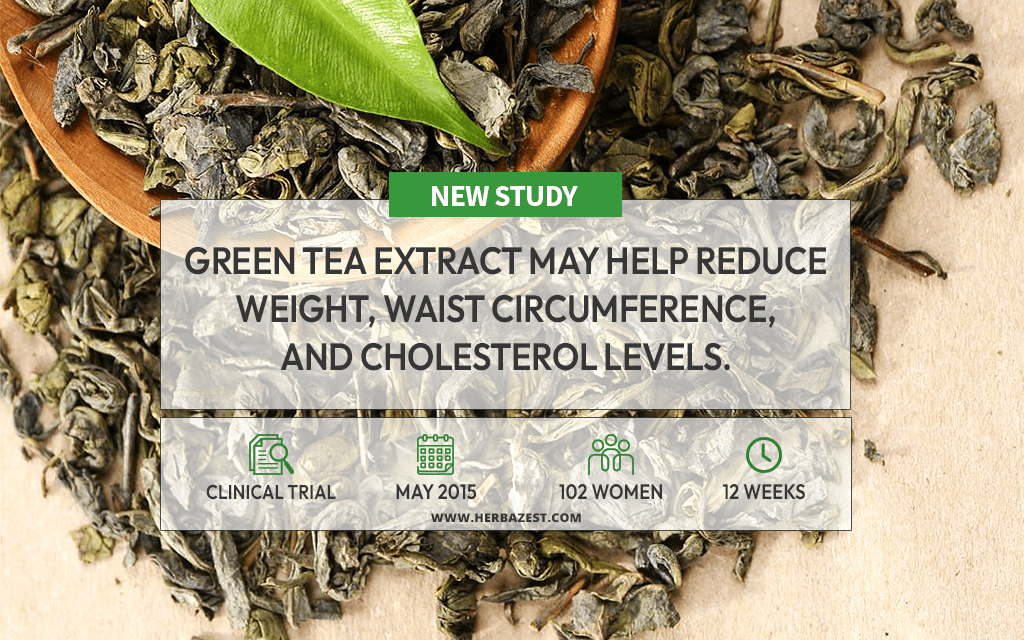It is estimated that the global prevalence of obesity has nearly tripled over the last 50 years.1 While lifestyle modifications are an effective approach to managing obesity, many people find them difficult to maintain. Pharmacological treatments and surgical interventions, on the other hand, offer varying degrees of success, but the adverse effects associated with these methods have spurred interest in alternative approaches.
One such alternative is the use of green tea, which is naturally rich in catechins, particularly epigallocatechin gallate (EGCG). EGCG is believed to promote weight loss by enhancing fat oxidation and influencing lipid metabolism. However, its effectiveness in reducing body weight remains inconclusive, as previous studies have produced mixed results. This clinical trial aimed to examine the potential benefits of green tea for weight loss.
The Study
A total of 102 women were selected for this clinical trial based on their body mass index (BMI ≥ 27 kg/m²) and waist circumference (≥ 80 cm). They were randomly assigned to either the treatment group or the placebo group, with the treatment period lasting 12 weeks.
Participants in the treatment group received a daily dose of 856.8 mg of EGCG from green tea extract, divided into three doses taken after meals. The placebo group received a cellulose capsule, and both groups were instructed to maintain their regular diet and physical activity levels throughout the study. Anthropometric measurements, lipid profiles, and hormone levels were recorded before and at the end of the study.
The Results
After 12 weeks, significant reductions in weight, BMI, and waist circumference were observed in the treatment group compared to the placebo group.
In addition to weight loss, the treatment group demonstrated favorable changes in lipid profiles, particularly in total cholesterol and LDL cholesterol levels. However, there were no significant changes in triglyceride or HDL cholesterol levels.
The study also found significant changes in obesity-related hormone peptides. Participants in the green tea extract group experienced a notable reduction in ghrelin levels and an increase in adiponectin levels compared to the placebo group. Ghrelin, known as the "hunger hormone," is typically associated with increased appetite and fat storage, while adiponectin is a hormone that enhances insulin sensitivity and promotes fat breakdown.
Importantly, no significant adverse effects were reported during the study. A few participants experienced mild abdominal discomfort during the first week of treatment, but these symptoms resolved without the need for additional intervention.
What Does this Mean?
The findings of this study suggest that high-dose green tea extract may promote weight loss and improve metabolic health in women with central obesity. The observed reductions in weight, BMI, and waist circumference, combined with favorable changes in lipid profiles, provide strong evidence supporting the use of EGCG-rich green tea for weight management.
One of the most interesting aspects of the study is the potential role of ghrelin and adiponectin in mediating the effects of green tea extract on weight loss. The decrease in ghrelin levels in the treatment group may help explain why participants experienced reduced hunger and, consequently, weight loss. Additionally, the increase in adiponectin levels suggests that EGCG from green tea may enhance fat metabolism and improve insulin sensitivity, further contributing to its anti-obesity effects.
Future studies are needed to confirm the long-term benefits of using green tea extract for weight management and to explore its potential in combination with other weight-loss strategies.
Other herbs that may help manage weight include cinnamon, ginger, turmeric, and fenugreek.
Sources
- Clinical Nutrition Journal, Therapeutic effect of high-dose green tea extract on weight reduction: A randomized, double-blind, placebo-controlled clinical trial, 2015
Footnotes:
- Metabolism. (2022). A 2022 update on the epidemiology of obesity and a call to action: as its twin COVID-19 pandemic appears to be receding, the obesity and dysmetabolism pandemic continues to rage on. Retrieved September 9, 2024, from https://www.ncbi.nlm.nih.gov/pmc/articles/PMC9107388/




